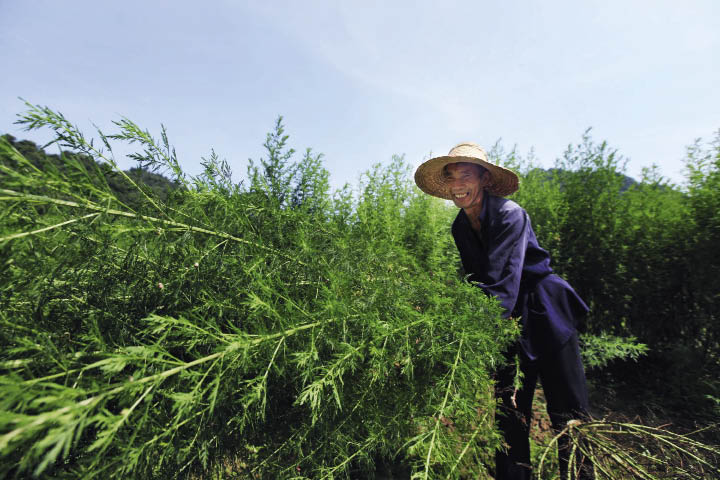Chinese Anti-malaria Drugs Stand up to Tests
State Food and Drug Administration (SFDA) data show that anti-malaria drugs produced for export must be registered and certified by the SFDA. Also that they are manufactured only on specific certified production lines and undergo strict approval processes in the importing countries.
Tanzania and other importing countries each have their respective certification systems. “Chinese-made anti-malaria drugs are distributed to patients and hospitals by the Tanzania food and drugs authority, which checks manufacturers’ accreditations, inspects their production sites and carries out customs inspections,” Ali said.
The food and drugs authority in Uganda has rigorous management and operation standards, according to Kong Dongsheng, marketing manager of the Kunming Pharmaceutical Corporation (KPC) in Uganda. The two anti-malaria drugs the KPC markets in Uganda are registered in the country. Every import deal entails an exhaustive process of applying to the Uganda food and drugs authority for an import permit, accordingly arranging production and delivery and applying again for customs inspection and clearance before the medicine can enter the country. The Uganda food and drugs authority also carries out inspections of production sites every four years. Drug safety violators face stiff civil and criminal penalties.
 |
| Artemisinin production in Rong’an County of Liuzhou in Guangxi Zhuang Autonomous Region, accounts for one fourth of the national total and one fifth of the global total. |
Reasons for Blaming China
In response to the Guardian claim that “they [counterfeit drugs]”, like poor quality mobile phones and cheap clothing, come from China,” Su Li, vice president of Guilin Pharmaceutical Company said: “The African drug market has historically been dominated by Western enterprises, and drugs have consequently been expensive. Over the past few years, more and more Chinese enterprises have sold quality, more reasonably priced drugs to African countries to help alleviate the shortage of medicines there and cure more patients. Chinese companies have thus inevitably challenged the market dominance of Western companies.” Manager of the Tanzanian branch of the Shanghai-based Hofon Contec Pharmaceutical Corporation Zhou Yong has exchanged ideas with local industry insiders, including local food and drugs authority officials. Their conclusion is that the Guardian report reflects certain complex attitudes resulting from the rapid development of China’s economy.
A KPC representative told reporters that the KPC has actively promoted high quality drugs in African countries, and that over the past two decades their quality has been unquestioned. In his view, the Guardian report can only have been based on hearsay and unsubstantiated information.
Ouyang Daobing likens assertions that counterfeit drugs from China prevent the elimination of malaria to viewing the problem through rose-tinted glasses. First of all, it is a proven fact that Chinese-made anti-malaria medicine is effective. Both the government and citizens of Uganda have confirmed the efficacy of the large amounts of anti-malaria drugs China has sent to Uganda through aid programs. Moreover, Uganda applies for aid from the Chinese government each year, and the strict supervision of drugs the government carries out makes it impossible to distribute or sell other than authentic products through standard channels.
Strengthen Cooperation in Combating Counterfeit Drugs
The investigation made clear that fake drugs are indeed being sold in certain African countries. This is in many cases attributable to the severe shortage of doctors and medicines, according to the Tanzanian food and drugs authority. Also that most local people have no way of distinguishing real drugs from fakes, other than that the latter are often cheaper.
Ugullum told reporters that although Tanzania conducts strict supervision and inspections of anti-malaria drugs, counterfeits still occupy a 20 percent market share. Most come either from fake factories in Africa or other continents, Ugullum said.
Chinese anti-malaria drugs such as artemisinin that have a good reputation in Africa have become targets for international counterfeit producers. This has had disastrous impact on the image of Chinese drugs.
Reporters found supervision of imported anti-malaria drugs in certain African countries to be sorely lacking. This has resulted in low-quality or counterfeit drugs from commissioned overseas manufacturing and certain small and medium-sized pharmaceutical companies getting business orders from developing African countries. Certain brands of Chinese anti-malaria drugs of good standing in Africa have hence been faked and sold by illegal producers there. Reporters also discovered existence of a small number of Chinese enterprises entrusted by illegal African businesses to illicitly produce and export drugs.
Another problem is that improper use and storage reduces the efficacy of drugs, so raising assumptions that authentic drugs are fakes. Anti-malaria drugs must be kept at a fixed temperature and humidity – conditions that cannot always be maintained during the process of transportation and storage, according to He Wenping, dean of the Africa Study Department of the Chinese Academy of Social Sciences.
Chinese pharmaceutical enterprises have taken measures to combat counterfeiting. They include establishing fixed distribution channels that enable the tracking of drugs. Also the affixing of labels confirming the authenticity of each export drug package.
China Chamber of Commerce of Medicines & Health Products Importers & Exporters statistics reveal a total export value of US $55.90 million to Africa from January to November of 2012 of Chinese artemisinin from its 71 member businesses. At present, 20 percent of Chinese drugs exported to Africa are anti-malaria drugs.
Cao Gang, deputy director of the Western Medicine Department of the China Chamber of Commerce Medicines & Health Products Importers & Exporters, suggests strengthened Sino-African cooperation as a means to combat the counterfeiting of Chinese drugs. This entails foreign traders adopting standardized purchase and import procedures and dealing solely with accredited businesses. China should also encourage pharmaceutical export companies to use anti-counterfeit laser technology that makes their products difficult to forge, and to give more support to leading pharmaceutical companies in acquiring international certification.

